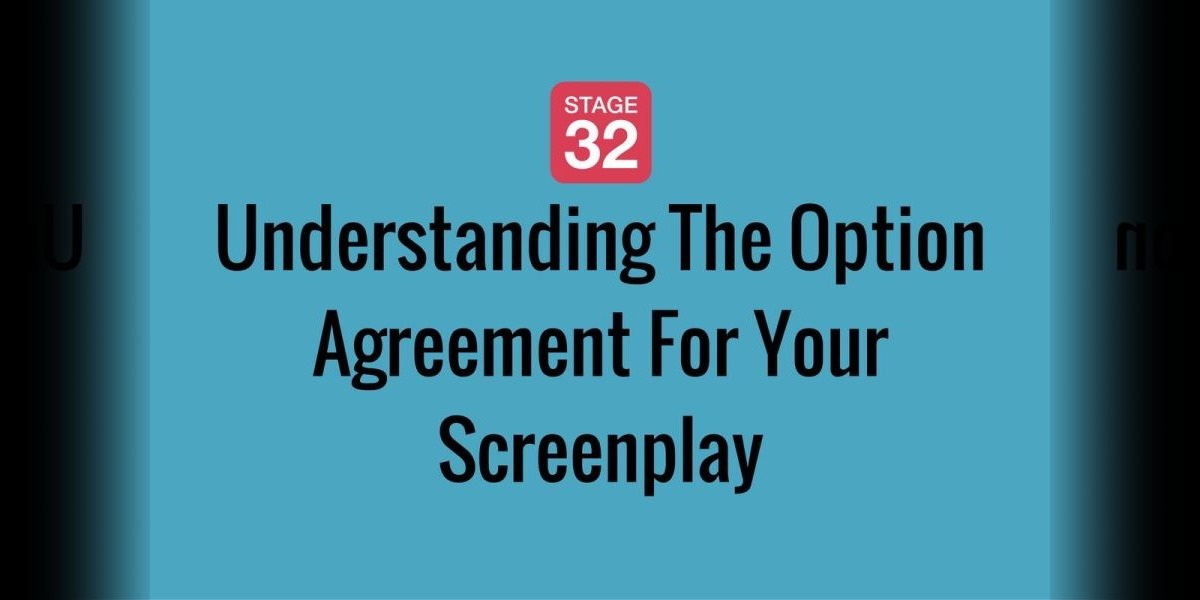Understanding The Option Agreement For Your Screenplay
Many writers dream that someday their story or script will garner interest from someone who wants to develop it into a film or TV project. Usually, the first step is when that someone, maybe a producer or a production company or even a studio, offers the writer a contract known as an option agreement. As with all such matters where art meets commerce, I always advise that if you are asked to sign anything – other than an autograph – you should have your lawyer review it first. Every writer should have a literary agent and a lawyer advising them about their business dealings once they get to this stage of the process, where the creative spills over into the business world.
An option agreement at its most basic is a contract whereby the writer grants someone, for a period of time and for a payment, the right to make a film of the writer's screenplay. The three main material issues that usually arise in negotiating such a deal are the length of the option period, the amount of the option payment and the purchase price if the project comes to fruition. How each of these issues will be resolved will vary depending on the negotiating leverage of the respective parties (i.e., whether the writer is a beginner or has had prior success in the industry and whether the producer is an experienced player or just a fledgling production company trying to get traction).
An option agreement will designate an 'option period' or length of time granted to a producer or studio to commence production of the project. It can range from six months to two years, or longer, depending on the negotiations. Such agreements frequently include additional periods of time for the producer to extend the length of the agreement in consideration of additional payments to the writer.
The option agreement will also set forth an 'option payment', which is the amount to be paid to the writer as consideration for allowing the producer the privilege of utilizing the writer’s screenplay for development purposes. Again, depending on the negotiating strength of each side, this could range from a very small amount (e.g., a few hundred dollars or even one dollar) to a larger payment (tens of thousands of dollars). Then, if the other party wants to extend the option period for an additional length of time, provision would be made for additional payments to the writer. In most cases, this additional payment will be negotiated to be more substantial even if the first payment is small.
The amount of the option payments will vary depending on the negotiation process and other factors such as the writer's track record in the industry and the potential budget of the film or TV project. Some industry insiders have said that as a rule of thumb, option payments are frequently equivalent to 10% of the purchase price, but these amounts are always negotiable and writers need to be careful not to allow themselves to be taken advantage of in the rush of excitement that surrounds interest in their screenplay.
Another material term in an option agreement is the 'purchase price', which is the amount of money that the writer will receive in the event the screenplay is made into a feature film or TV project. The purchase price is often calculated on a sliding scale as a percentage of the budget, so as the budget of the film grows, so will the purchase price, although as with all negotiated terms, this too can vary greatly.
When properly negotiated, an option agreement can be a win-win situation for both the writer and the producer. The writer is paid to lease his or her screenplays for a limited period of time, while the producer attempts to get the project green-lighted by a studio or production company. If this happens, the writer will receive a nice purchase price for his screenplay. If it does not happen during the option period, then the writer keeps the option payment or payments paid to date and all rights to the screenplay revert back to the writer. The writer could then decide to option the script again to another producer.
From the producer's perspective, an option agreement gives the producer an opportunity to hold on to a screenplay exclusively for a period of time, without having to lay out a lot of money up front while trying to get the project off the ground.
About Wallace Collins:
Wallace Collins is an entertainment lawyer and intellectual property attorney with more than 30 years of experience. He was a recording artist for Epic Records before receiving his law degree from Fordham Law School.
Wallace has represented actors, screenwriters, producers, recording artists, songwriters, record producers, book authors, magazine publishers, photographers and models, clothing and fashion designers, cartoonists, fine artists and art galleries, and website designers in contract disputes, negotiations, and business entity formation.
You can reach out to Wallace right here on Stage 32!
For more education on option agreements and other contracts, check out this Stage 32 Education by clicking here!
Like this blog post? Please share it on social media (Facebook, Twitter, LinkedIn, email etc) by using social media buttons at the top of the blog. Or post to your personal blog and anywhere else you feel appropriate. Thank you.
As always, we welcome thoughts and remarks on ANY of the content above in the Comments section below...
| RB's Stage 32 News, Notes, Discussions and Other Fun Stuff (August 26, 2016) |
| The Winning Screenwriters of Our Feature Contest Get Signed, Optioned and Now in Development! |
Search Stage 32 Blog
There are now 4035 blog posts for you to enjoy. Search them all by tags below.
Acting, Advice, Cinematography, Coffee & Content, Composing, Contests, Distribution, Featured, Filmmaking, Financing, Inspirational, Networking, Producing, Screenwriting, Success Stories, Tips, Trending,Relevant Tags
Recommended Articles

Green Lights and Grey Areas: Expanding Creative Collaboration in Publishing

Insider Intel: A-listers Are Dead. Long Live A-listers.

Coffee & Content: Reinvent the Story, Reinvent the Industry

Happy Thanksgiving From Stage 32: We Are Thankful For YOU

7 Life Hacks For Creatives

Don't Let the Momentum of November Write Club Die: How to Stay Active Into 2026 & Beyond!

Coffee & Content: Why Your Pitch Needs to Be Human

My Stage 32 Story: Persistence, Healing, & Creative Breakthroughs in Year 3

Insider Intel: Packaging your Project- The Chicken or the Egg Dilemma






